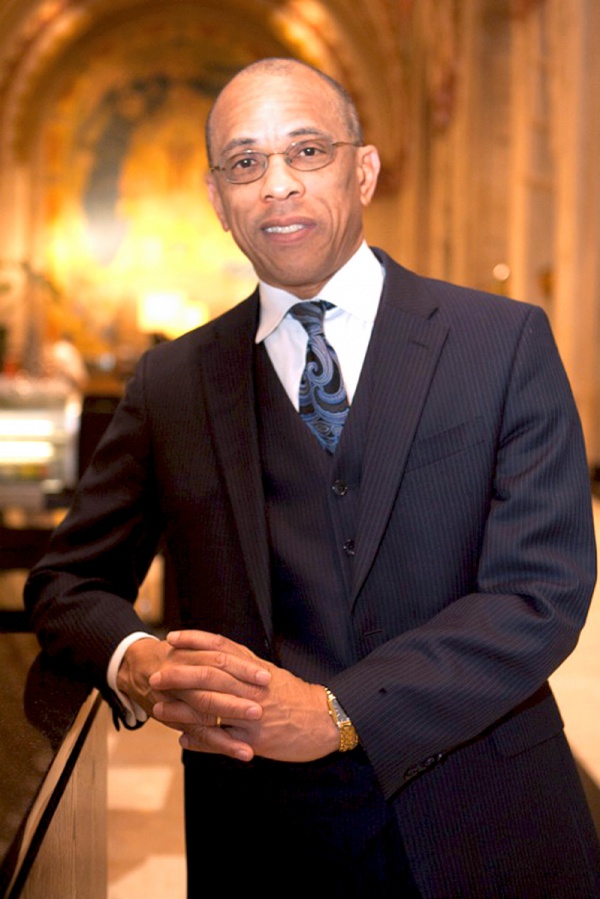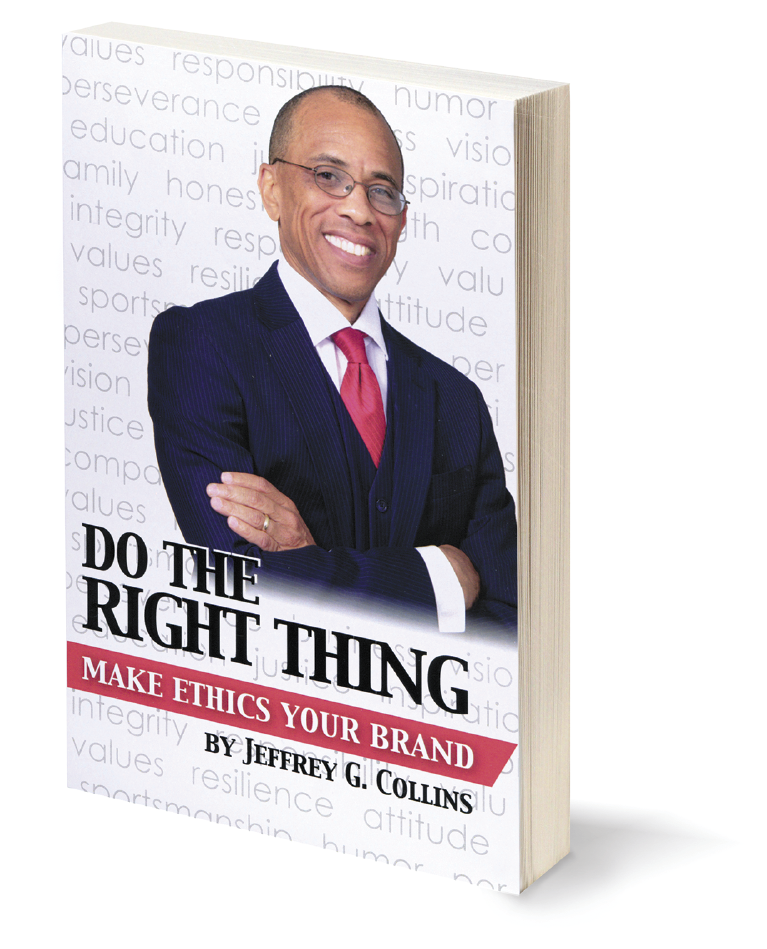
Jeffrey Collins has worn many hats in this town. He is a former U.S. attorney for the Eastern District of Michigan, an appeals court judge and a distinguished lawyer. Now he has authored a book on ethics titled “Do the Right Thing: Make Ethics Your Brand.”
In this interview with Bankole Thompson, editor of the Michigan Chronicle, Collins, who joined the administration of outgoing county executive Robert Ficano as ethics czar in the middle of heightening federal scrutiny, explains why he accepted the job to come in and straighten out an administration that saw top county officials falling on their swords as they pled guilty in a corruption probe where some are already serving jail time.
Did Collins use his relationship as a former prosecutor to stem the tide of a mounting investigation? Did he install any ethics rules in county government? What is his advice for the incoming county executive, Warren Evans, who defeated Ficano last November? What was Ficano’s biggest mistake? Find out in excerpts from the interview.

MICHIGAN CHRONICLE: Your appointment to the Wayne County government in the middle of a federal probe of the Robert Ficano administration raised many eyebrows because of your work as a former federal prosecutor. Why did you accept the appointment?
JEFFREY COLLINS: If a doctor sees a person choking and has the skill to save him, can the doctor in good conscience sit back and let the person suffer? It is an ethical question. In my view, Wayne County was choking and I had the skill to help. I decided to get involved. I accepted the appointment in an effort to restore public trust. I wanted to dislodge the practice of putting self-interest ahead of public interest. I believed that I could be value added and the citizens of Wayne County would benefit from having a strong ethical voice at the table. My focus was to help the greater good, namely the citizens of Wayne County, not to enhance the reputation of any particular person.
MC: Some are of the opinion that you were recruited to use your relationship as a former federal prosecutor to help rescue the Ficano administration from what critics called an “imploding administration.” Was this true?
JC: I do not know the motives of the people that recruited me. I believe the body of my work, which goes beyond the United States Attorney’s Office, was the deciding factor. To regain confidence, it helped to hire a known quantity that is trusted. I felt the need to stop the bleeding and to stabilize the patient. I accepted the job, not to rescue the Ficano administration, but instead to rescue the patient, Wayne County.
MC: What was at the back of your mind when you accepted to work for the this administration, knowing that in the eyes of the public it was an ethically challenged administration?
JC: As I indicated earlier, I accepted the job in an effort to restore public trust. I thought the public would applaud having an ethical voice at the table. I felt the public would welcome a voice that constantly challenged the administration to consider ethics when making decisions. Character is tested in times of controversy. I felt equipped to handle the challenge.
MC: Is there anything you think is misunderstood when it comes to your work for Ficano?
JC: What is misunderstood is the number of honest hardworking people at the county. Wayne County has over three thousand employees who day in and day out do the right thing. It is unfortunate that the acts of a few have overshadowed the good work of so many. Our department directors are doing an excellent job and have received a number of awards. They have helped to move the county forward during a very stressful and turbulent period.
MC: How do you think your appointment helped Ficano’s administration on the question of ethics?
JC: Immediately after I was hired, I was given the green light by the CEO to usher in a new ethics policy for the executive appointees. In addition, I conducted multiple trainings on ethical leadership throughout Wayne Conduct government. Ethics is now a topic that is openly discussed. Following the training, unsolicited, our executive team would ask, what is the right thing to do? That question was not being asked when I first arrived. My appointment also helped with establishing a climate of transparency.
When I started, our website received the lowest grade in the state by the Sunshine Review on transparency in government, a D-. A few weeks ago, we came full circle by receiving an A+, the highest grade in the state. There was also more focuse on ethics in hiring. I am proud that the new hires represent standards of excellence and integrity. The citizens of Wayne County are being well served by their commitment.
Finally, we have displayed solid ethics with the federal investigation. We have pledged total cooperation. We have volunteered information and witnesses. I made a decision to err on the side of disclosure. We have assisted the government in discovering the truth. We have done the right thing by not playing hide the ball.
MC: What was the biggest ethical mistake of the Ficano administration?
JC: Having a culture that allowed a public employee to receive a severance was a big mistake. The Ficano administration’s initial defense of the severance created a presumption of greed and self- dealing. Since my arrival at the county, we have tried to disprove the presumption. Immediately, I put in checks and balances that would prevent the severance mistake from reoccurring and from employees getting paid from sitting on county related boards. The policy also prohibited political activity in the workplace. The policies were designed to dismantle a culture of placing self-interest over public interest.
MC: What should incoming Wayne County Executive Warren Evans do differently when it comes to ethics ?
JC: I think Warren Evans is off to a good start. On his transition team he has designated a former judge to serve as an ethics officer. It is important that he continues training on ethics. I would recommend that he keeps his finger on the pulse of the administration and he holds people accountable. The ethical tone of an organization is set at the top and it is important he leads by example.
MC: During your tenure as U.S. attorney, what was the most instructive moment you recalled that was an ethical challenge for you or your office?
JC: Our office conducted the first terrorism trial in the nation after the horrific events of 9/11. Following the guilty verdict, it became clear to me that our lead prosecutor did not play by the rules. I removed him from the case and ultimately the Department of Justice asked the court to throw out the conviction. Even though combating terrorism was our top law enforcement priority, the right thing to do was to throw out the contaminated verdict. This decision was consistent with the mission of the DOJ to obtain justice, not convictions.
MC: What did you discover in your work that made you write a book on ethics?
JC: Through my work in the public and private sector, I have seen intellectually gifted people who lack an ethical compass. Consequently, these talented people do not reach their potential and society loses out on their brilliance. The obsession with getting ahead or getting over has caused people of all races, professions and ages to compromise their ethics.
I represented Major League Baseball in a steroid investigation and I observed physically gifted athletes take ethical shortcuts. I have seen brilliant lawyers, obsessed with winning, not share information with the opposing side. I have seen dedicated doctors’ bill insurance companies for services that were not rendered. I have seen trusted public officials take kickbacks and bribes. What caused all of these exceptional people to go wrong?
I wrote a book to share my experiences on how to build an ethical brand. The book is a celebration of living an ethical, principled life.
MC: What do you hope the book will provide for readers?
JC: I hope the book is a community call to action that raises our ethical consciousness. I hope readers are inspired to examine their own ethical code and to understand what drives unethical behavior. I share lessons learned in the workplace as well as personal stories as a parent and as a coach. Readers are encouraged to use ethical behavior to improve society and the quality of life. Ethics includes treating people fairly and trying to bring out the best in people.
MC: How has the book been received so far?
JC: The reception to the book has been fantastic. The night of the book launch, I received emails from people who took the book home and were inspired to read it right away. The most frequent reaction has been that the book should be required reading for students, parents, public officials and people of all walks of life. I am pleased the stories and illustrations resonate.
MC: You mentioned what your dad told you and your brother regarding the virtues of honesty and building what you consider an ethical brand. Explain how your dad was influential in your life.
JC: My parents were influential through leading by example. Both my mom and dad have a long track record of serving the community. Countless people tell me, “Your dad took care of me” or “Your mother taught me how to read.” From their example, my brother and I have learned to define success by how much you help people and how well you treat them.